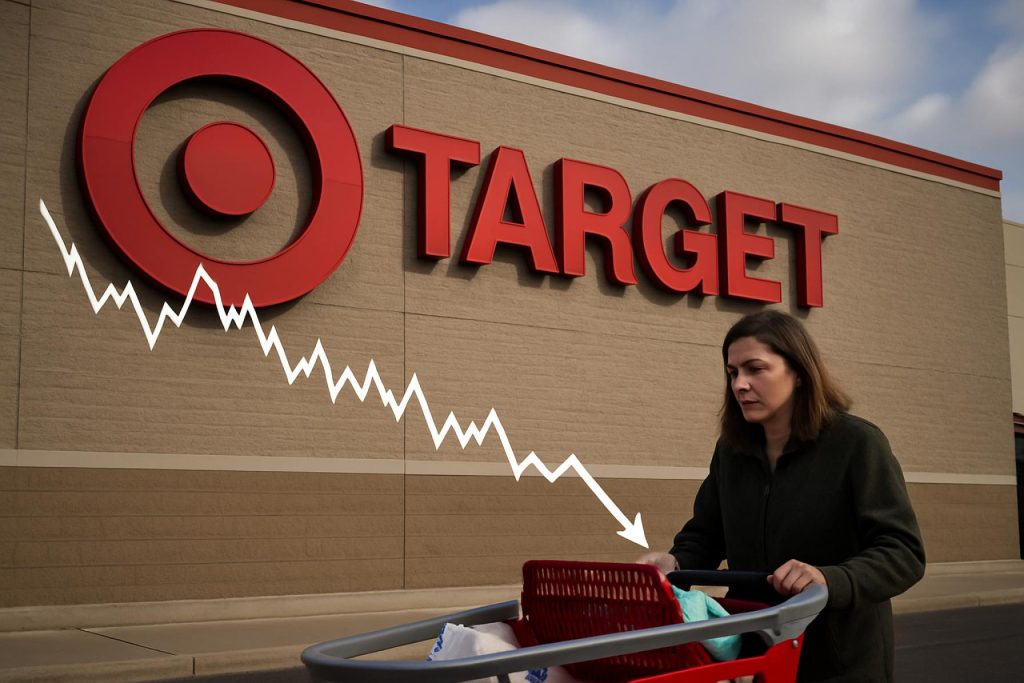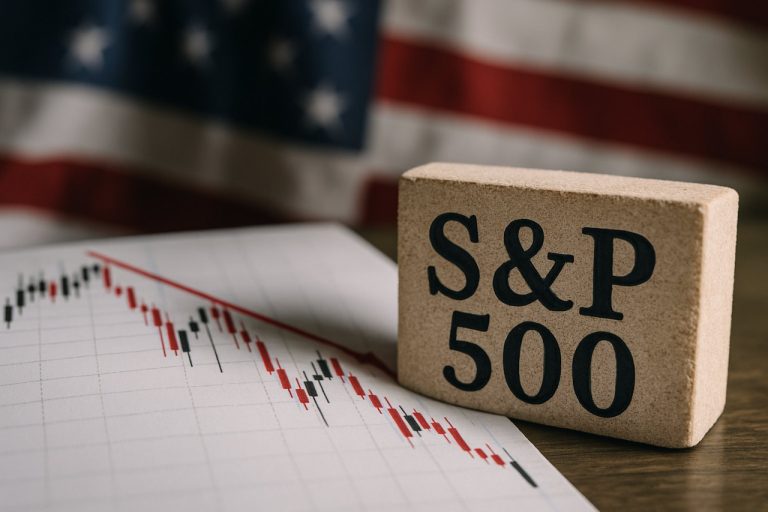
- Target’s revenue fell over 2.8% to $23.85 billion, missing expectations and prompting a cautious outlook for future quarters.
- Two major issues triggered the decline: consumer backlash over changes to diversity, equity, and inclusion (DEI) policies, and anxiety about potential trade tariffs.
- Stock dropped nearly 7%, down 33% this year, with leadership now expecting low-single-digit sales declines and lowered earnings projections.
- Tariff fears are prompting consumer caution, yet Target pledges to avoid price hikes unless absolutely necessary, in contrast to some competitors.
- DEI policy shifts have drawn criticism from both conservatives and LGBTQ advocates, deepening Target’s cultural challenges and impacting its relationship with core shoppers.
- The company faces ongoing identity struggles and heightened scrutiny as it navigates both economic and societal headwinds.
America’s favorite bullseye is wavering. The bright-red doors of Target, usually a haven of bustling carts and seasonal displays, have seen their rhythm disrupted. Revenue tumbled more than 2.8% this past quarter to $23.85 billion—well below expectations—and executives are bracing for leaner months ahead.
What’s fueling this abrupt downturn? Walk the aisles and you’ll sense an unusual hush, the air heavy with more than just economic anxiety. CEO Brian Cornell and CCO Rick Gomez point to two engines of trouble: a bruising consumer boycott tied to diversity, equity, and inclusion controversies, and a broader consumer retreat, ignited by the looming threat of trade tariffs.
- DEI Backlash: The spark was lit when Target announced a rollback of its widely-publicized diversity initiatives. Some consumers, angry over the company’s shifting stance—especially after last year’s tense Pride Month debates—walked out with their wallets.
- Tariff Tensions: With talk of new tariffs casting long, unpredictable shadows, families are tightening belts, wary of potential price hikes on the essentials they rely on.
Shares take a hit. On Wednesday, the price of Target stock dipped nearly 7%, resting just above $91, and is now down 33% for the year. The company doesn’t expect a quick recovery. After previously forecasting modest growth, Target’s leadership now predicts a low-single-digit decline in sales, adjusting earnings targets downward to a range between $7 and $9 per share.
Will prices surge on store shelves amidst tariff turmoil? Brian Cornell insists there’s no rush to raise prices. He emphasizes that Target has “many levers to use in mitigating the impact of tariffs.” While some rivals such as Walmart have signaled likely hikes, Target promises restraint, reserving higher price tags as a “very last resort.”
This cool resolve contrasts sharply with alarm bells ringing across other industries. Tech giants, including Apple, forecast multi-million-dollar losses. Airlines like Delta and Southwest Airlines, and household names such as Ford and Ferrari, are all lowering revenue projections and warning of tariff-induced pain in 2025.
The roots of Target’s identity struggle run deep. Following the 2020 killing of George Floyd, Target became a national voice on DEI, ramping up efforts to hire and promote people of color and women. But the culture war over Pride merchandising last year, stoked with misinformation online, left the retailer squeezed between conservative boycotts and sharp criticism from advocates and political leaders like California Governor Gavin Newsom. In January, Target’s abrupt DEI reversal—based on “years of listening and learning”—sparked new backlash from its most loyal customers and community partners.
- Conservatives accused Target of selling inappropriate merchandise to children, claims the company refuted.
- LGBTQ advocates lamented the retailer’s move to scale back support, with accusations of betraying core values for profit’s sake.
Shoppers, feeling the tension and economic uncertainty, are responding with their feet— and their dollars. Now, as Target navigates headwinds on both cultural and economic fronts, one question remains: can this iconic retailer regain its footing before the next earnings call?
One thing is certain—the aisles will tell the story. And, as shoppers scan those familiar shelves, Target’s choices in 2025 will be on display for all to see.
Target’s Crisis: The Shocking Truth Behind Sliding Sales & Scandal
-
Pros
-
Resilient Leadership:
Executives at Target claim to have strategies in place to address both tariff impacts and cultural backlash, aiming to avoid price hikes and maintain shopper loyalty.
-
Commitment to Affordability:
Target vows to keep prices steady as a “very last resort,” even as competitors like Walmart hint at increases, which may help retain value-conscious shoppers.
-
Resilient Leadership:
-
Cons
-
Revenue Decline:
Quarterly revenue fell over 2.8%, sending shockwaves through investors and dropping stock prices by nearly 7% in a single day.
-
Brand Identity Crisis:
The recent rollback of diversity, equity, and inclusion efforts has alienated both conservative and progressive customers, intensifying boycotts and public criticism.
-
Revenue Decline:
-
Controversies & Limitations
-
DEI Backlash:
Target’s shift away from vocal DEI support—first announced after the 2020 George Floyd protests—sparked backlash from all sides. Conservatives denounced the original policies; LGBTQ advocates protested the reversal, calling it a betrayal. Political leaders, like California governor Gavin Newsom, added pressure with public criticism.
-
Economic Headwinds:
Tariff uncertainties and inflation fears are eroding consumer confidence. Industry peers such as Apple, Ford, Delta, and Southwest Airlines are also warning of tough times ahead, suggesting industry-wide limitations beyond Target’s control.
-
Uncertain Recovery:
Executives are bracing for continued declines in sales and have pulled back on earlier growth forecasts, signaling an unclear path back to robust financial health.
-
DEI Backlash:
Target’s Turbulent Aisles: What the Future Holds—Shocking Predictions for Retail’s Red Giant!
-
Continued Pressure from Consumer Activism
Boycotts driven by Target‘s shifting positions on Diversity, Equity, and Inclusion policies are expected to influence sales in the near future. The retailer will likely face public scrutiny and rapid opinion swings as activists and loyal shoppers keep a close watch on corporate decisions through 2025 and beyond.
-
Tariff Woes and Price Uncertainty
With ongoing threats of new trade tariffs, the next 1-2 years may bring increased pressure on supply chains and margins. Though Target pledges price stability, analysts forecast possible modest price increases and continued belt-tightening among consumers. Rivals like Walmart may move first, possibly shifting perception and market share.
-
Industry-wide Ripple Effects
As seen with warnings from major companies such as Apple, Delta, Southwest Airlines, Ford, and Ferrari, tariff-driven uncertainty isn’t isolated to retail. The next years will likely bring collaborative advocacy from large corporates seeking policy solutions—and possibly, new alliances spanning retail and manufacturing.
-
Reinventing In-Store Experience
As traffic softens, Target may accelerate investments in digital-first strategy and experiential retail. Enhanced app features, convenient pickups, and limited-edition collaborations could become center stage as the company rebuilds shopper loyalty.
-
Leadership and Brand Identity under the Microscope
The balancing act between values and profits will be ongoing. High-profile leaders like CEO Brian Cornell and CCO Rick Gomez will face concerted pressure to clarify Target‘s stance on social issues, while maintaining profitability. Industry watchers predict more public statements and strategic pivots ahead of the 2025 earnings cycle.
-
Slow Recovery Horizon
Given the recently announced downward adjustments to sales and earnings forecasts, most analysts expect recovery to be slow through 2025. Target’s performance will hinge on external economic conditions and its ability to reconnect with core shoppers amid heightened competition.
-
Political and Regulatory Developments
With national figures like California Governor Gavin Newsom weighing in, expect further regulatory and legislative attention on retail practices regarding both trade and inclusion. New policies could reshape the retail landscape as early as next year.
Retail is headed for a high-stakes, high-speed transformation—and Target finds itself right in the crosshairs. Expect twists, turns, and headline-making moves as America’s go-to retailer fights for its future.



